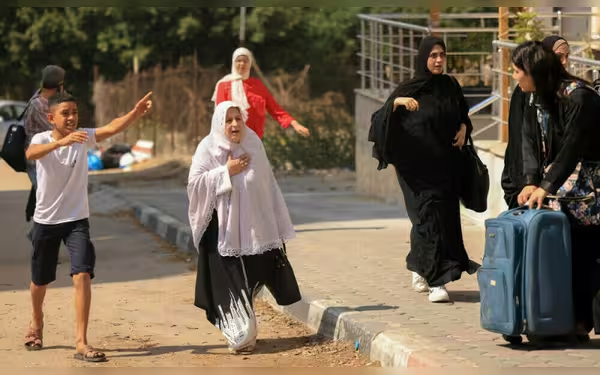Monday, November 25, 2024 06:00 AM
UNRWA Chief Warns of No Alternative for Palestinian Refugees
- UNRWA provides essential services to nearly six million refugees.
- Israeli ban on UNRWA raises global concerns and condemnation.
- Safety of UNRWA employees jeopardized amid escalating tensions.
 Image Credits: brecorder
Image Credits: brecorderUNRWA chief Philippe Lazzarini warns of no alternative support for Palestinian refugees amid Israeli ban and escalating tensions.
In a world where humanitarian crises are becoming increasingly common, the plight of Palestinian refugees remains a pressing issue. The United Nations Relief and Works Agency for Palestine Refugees (UNRWA) has been a crucial lifeline for nearly six million Palestinian refugees, providing essential services such as food, healthcare, and education. However, recent developments have raised serious concerns about the future of this vital organization, particularly in light of Israel's recent order to ban UNRWA from operating in areas under its control.
Philippe Lazzarini, the head of UNRWA, made it clear that there is "no plan B" when it comes to supporting Palestinian refugees. Speaking to reporters in Geneva, he emphasized that no other agency within the United Nations is equipped to provide the same level of assistance that UNRWA does. While alternative means of delivering food aid may exist, Lazzarini pointed out that the same cannot be said for education and primary healthcare, which are critical for the well-being of children in the region.
The situation escalated when the Israeli parliament approved a ban on UNRWA, a move that has drawn global condemnation, including from the United States, a key ally of Israel. Lazzarini has urged the UN to intervene and prevent the implementation of this ban, warning that it would severely hinder the agency's ability to coordinate aid efforts in Gaza. He stated, "This would mean we could not operate in Gaza … and thus the environment would be much too dangerous." This statement underscores the precarious situation faced by both the refugees and the agency tasked with their support.
Moreover, Lazzarini expressed concern for the safety of UNRWA employees, who may face harassment or legal repercussions due to the ban. He highlighted the fear that these individuals could be arrested or investigated simply for being associated with an organization that is now being labeled as a terrorist entity by some. This adds another layer of complexity to an already dire humanitarian situation.
The tensions between UNRWA and Israel have been exacerbated by accusations that some agency staff were involved in a recent attack by Hamas on October 7, 2023. While investigations have revealed some issues related to neutrality, they have not substantiated Israel's more serious allegations. This ongoing conflict raises questions about the future of humanitarian aid in the region and the potential consequences for millions of vulnerable individuals.
The future of Palestinian refugees hangs in the balance as the UN and its agencies face unprecedented challenges. The potential ban on UNRWA not only threatens the immediate support provided to those in need but also raises broader questions about the role of international organizations in conflict zones. As the situation develops, it is crucial for the global community to remain vigilant and advocate for the rights and needs of Palestinian refugees, ensuring that they do not become collateral damage in a larger political struggle.













